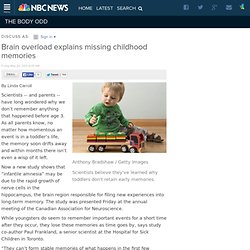

Memory - Mapping Memory 3D Interactive - National Geographic Magazine. Brain overload explains missing childhood memories. Anthony Bradshaw / Getty Images Scientists believe they've learned why toddlers don't retain early memories.

By Linda Carroll Scientists -- and parents -- have long wondered why we don’t remember anything that happened before age 3. As all parents know, no matter how momentous an event is in a toddler’s life, the memory soon drifts away and within months there isn’t even a wisp of it left. Now a new study shows that “infantile amnesia” may be due to the rapid growth of nerve cells in the hippocampus, the brain region responsible for filing new experiences into long-term memory. While youngsters do seem to remember important events for a short time after they occur, they lose these memories as time goes by, says study co-author Paul Frankland, a senior scientist at the Hospital for Sick Children in Toronto.
“They can’t form stable memories of what happens in the first few years,” Frankland says. But nobody really knew the details of what happens in a toddler’s brain. Dr. Sleep's memory role discovered. 5 June 2014Last updated at 19:44 ET By James Gallagher Health and science reporter, BBC News The mechanism by which a good night's sleep improves learning and memory has been discovered by scientists.

The team in China and the US used advanced microscopy to witness new connections between brain cells - synapses - forming during sleep. Their study, published in the journal Science, showed even intense training could not make up for lost sleep. Experts said it was an elegant and significant study, which uncovered the mechanisms of memory. It is well known that sleep plays an important role in memory and learning.
Researchers at New York University School of Medicine and Peking University Shenzhen Graduate School trained mice in a new skill - walking on top of a rotating rod. They then looked inside the living brain with a microscope to see what happened when the animals were either sleeping or sleep deprived. A connection between two brain cells Analysis These include: How does your memory work? How We Make Memories - Crash Course Psychology #13. On the Tip-of-the-Tongue: Blocked Memories. What is this instrument called?

Is it on the tip of your tongue? “What’s the name of that guy who was in that film with…you know the one…he’s…no, no it’s not Denzel Washington, the other guy. Oh God, I know it, it’s right there. This is driving me crazy…! I can see his face. The tip-of-the-tongue or ‘TOT’ phenomenon is now well-documented in psychology. Sometimes all you can think about is something similar, say another actor who is often in the same types of films. Studies on blocking have shown that around half of the time we will become ‘unblocked’ after about a minute. As anyone getting on in years will tell you, blocking increases with age. The taste of words on the tip of the tongue One fascinating aspect of the ‘TOT’ phenomenon is the study of synaesthetes. This last category, a rare form known as lexical-gustatory synaesthesia, provides an opportunity to study the TOT phenomenon in an unusual way. Magically, there’s evidence this really does happen. References James, L. 7 Sins of Memory - Epic Science.
7 Sins of Memory. Psychologists have found that right from the moment an event occurs to the moment we try to retrieve it, our minds are fallible.

Memory: 10 Fascinating Quirks Everyone Should Know. Why we remember and why we forget: it’s context, fading emotions, deep processing, the ‘Google effect’, the reminiscence bump and way more… Many people say they have bad memories, but the majority are wrong.

The way memory works can be unexpected, frustrating, wonderful, and even quirky — but not necessarily ‘bad’. For most of us the problem isn’t with our memories, it’s with understanding how memory works. Here are ten interesting quirks of memory which provide a better insight into what makes us remember — or forget. 1. What we can remember partly depends on the situation and mental state we are in at the time. This is because our memories work by association. The context itself can refer to all kinds of things: some things are easier to remember in a certain place, others when we experience specific smells, others when we are in particular emotional states. 2. Memory and Recall: 10 Amazing Facts You Should Know. Human memory and recall works nothing like a computer, but that’s what makes it all the more fascinating to understand and experience. “If we remembered everything we should on most occasions be as ill off as if we remembered nothing.”
~William James It’s often said that a person is the sum of their memories. Your memory and recall is what makes you who you are. Despite this, memory and recall is generally poorly understood, which is why many people say they have ‘bad memories’. Here is my 10-point guide to the psychology of memory and recall (it is based on an excellent review chapter by the distinguished UCLA memory expert, Professor Robert A. 1. Everyone has experienced the frustration of not being able to recall a fact from memory. So it seems obvious that memories decay, like fruit going off. The Science of Memory.